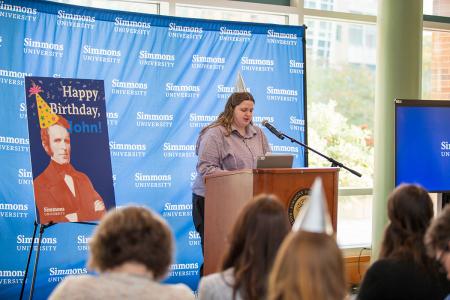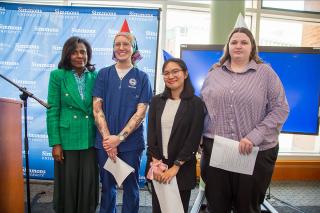Simmons Founder's Day 2024 was a particularly special event, given the 125th anniversary of the University. For this event, Simmons undergraduates are invited to submit essays about how their experience at Simmons realizes John Simmons' vision for educating students for their life's work. This annual tradition has been around for more than one hundred years, with the first Founders Day occurring in 1912 to honor the birthday of John Simmons and to educate students about this institution’s rich history.

In honor of the 125th anniversary, three winners were chosen this year. Transfer student Kadyn Donovan ’27 (Nursing) and international student Micah Joyce Guillermo ’26 (Political Science and Communications) were both honored for their submissions. Our first-place winner, Abigail Gill ’26, is a student in the 3+2 Engineering program, currently studying Computer Science at Simmons and hoping to concentrate in Biomedical Engineering at Columbia in the latter part of the program. Gill read her essay, “The Butterfly Effect,” at the event. The full text is provided.
The Butterfly Effect
by Abigail Gill 26
As we honor 125 years of Simmons’ commitment to equality, we look to the past to see how far we have come. The butterfly effect suggests that even the smallest actions can set off a chain of events leading to monumental changes. The founding of Simmons College in 1899 can be seen as the gentle flap of a butterfly’s wings, initiating waves of equality and empowerment. At a time when opportunities for women were rare, John Simmons envisioned an institution where women could feel empowered through education, setting in motion a transformative process that has touched countless lives.
In 1902, our university welcomed its first class of 146 students, who became the first to receive a well-rounded Simmons education. They were trailblazing women who challenged gender norms by pursuing careers in business, social work, and education, which men had previously dominated. These women went on to become role models in their communities and an inspiration to education-seeking women everywhere. Bertha Mahoney, for example, founded The Horn Book Magazine in 1924 after earning her bachelor’s degree in Secretarial Studies in 1906. Simmons’ groundbreaking programs not only prepared women for successful careers but also began to disrupt society's perceptions of what women could achieve. As more graduates entered the workforce, equipped with values of equality and professional competence, the dynamics within companies began to shift; reflecting a growing recognition of the value of hiring educated women.
As women entered the workforce, other issues related to equality became increasingly important topics of discussion. The first African-American woman graduated from Simmons in 1914, but the enrollment disparity of these women compared to the enrollment of Caucasian women was still quite apparent. In 1965, Simmons students who advocated for equality, like Paula Sneed, not only began to push for gender equality, but racial equality as well. Sneed entered Simmons in 1965 with a concentration in social work. She held the position of President of the Black Student Organization in 1969 when the Ten Demands were presented. The Ten Demands were a list of expectations curated by members of the BSO that included calls for increased enrollment of Black students and faculty, the creation of an African American studies program, and a larger financial aid budget allocated for these students.
Within a year, the percentage of Black students on campus grew from 8% to 12%, illustrating how collective action can create echoes of change within our institution. The commitment to equality at Simmons continued to evolve, particularly with the decision to formally allow transgender students to enroll in 2014. Under the leadership of its 8th President, Helen Drinan, Simmons became the third women-centered institution in the country to welcome students who identify as transgender or non-binary. This decision created waves in what defines a women’s college, encouraging the gradual shift in terminology when speaking about these institutions. We now like to use more inclusive terms that focus on the historical women-centered nature of our university, while celebrating students of diverse gender identities. Simmons has contributed to a cultural shift that continues to grow and disrupt patriarchal ideologies that have confined us for centuries.
Making waves takes courage, something that Simmons’ students are often equipped with an abundance of. Jahaira DeAlto Balenciaga, a passionate and motivated social work student who is an excellent representation of courage. DeAlto was an activist of many forms, bringing attention to the struggles faced by transgender individuals, first-generation and low-income students, and people of color. She was adopted from Lebanon and transitioned at the age of sixteen. This subjected her to bullying and harassment throughout her life, but she did not let that discourage her. She decided to make waves by founding the Transgender Day of Remembrance and Berkshire Pride Festival, developing a peer mentorship program for first-generation and low-income students. She became a counselor at the Elizabeth Freeman Center LGBTQ Community Advisory/Action Group in her free time where she received the Victim Rights Month Special Recognition Award for her work in advocating for victims of violence and abuse. DeAlto’s life was tragically cut short after her murder in 2021, but her light liveson within the Simmons’ community with the Jahaira M.DeAlto scholarship fund being endowed in her memory and honor.
Simmons' impact extends far beyond its campus, touching lives and communities for over a century. Students have always been at the heart of Simmons, each building their own waves of change working towards a future of equality. As a first-generation student, I sometimes bear the weight of imposter syndrome and insecurity. But when I think of those who came before me — pushing through doubt and breaking barriers — I’m reminded of the strength and determination that define this community. As we honor Simmons’ legacy, I am reminded that each of us have the power to influence the future in profound ways. Just as John Simmons sparked this transformative journey 125 years ago, I too aspire to create my own flutter of change in this world.
Watch this year’s winner, Abigail Gill ’26, read her essay for the Simmons community.

